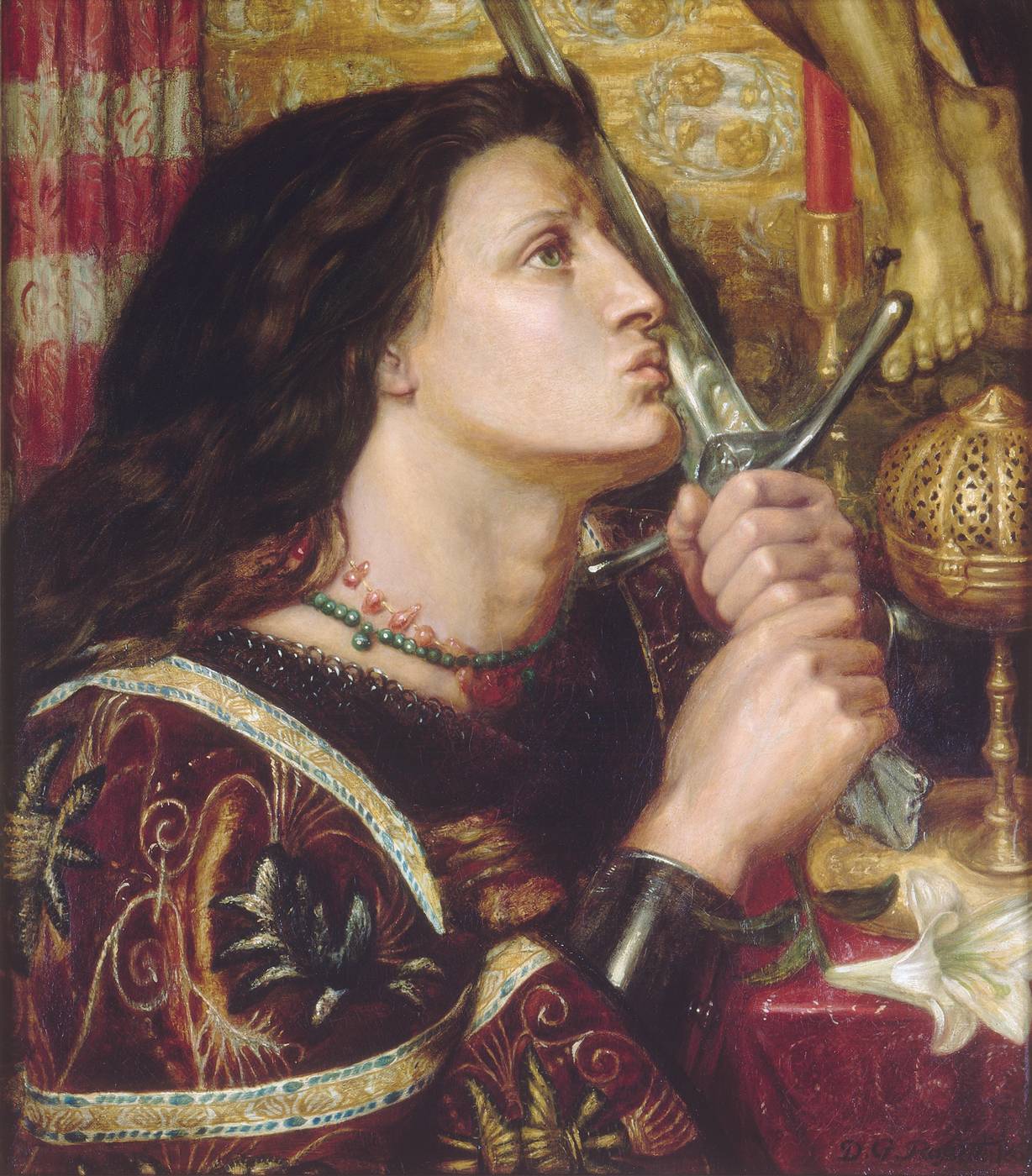Medieval History

 This kind of research is impossible with Joan of Arc. Even if I read an entire book a week, I doubt I could read all published works about Joan before I was 72. Thousands and thousands of tomes, articles, poems, movies, music, biographies...its overwhelming in the largest sense of the word. Since I have been trained to write only after consuming great volumes of writing, I try not to let the sheer volume of Jehannic literature deter me. I also have four children under five-years-old, one of whom has special needs.
This kind of research is impossible with Joan of Arc. Even if I read an entire book a week, I doubt I could read all published works about Joan before I was 72. Thousands and thousands of tomes, articles, poems, movies, music, biographies...its overwhelming in the largest sense of the word. Since I have been trained to write only after consuming great volumes of writing, I try not to let the sheer volume of Jehannic literature deter me. I also have four children under five-years-old, one of whom has special needs.
So I am taking my time, trying to line up the 'most important' published works on Joan. One thing I am struck by is how often Joan's psychological health was of primary interest in the 20th century. People just couldn't leave it alone. Was she bipolar? Schizophrenic? Delusional? Explaining away her visions, her voices - what was wrong with Joan of Arc?
This strikes me as a peculiarly post-modern approach to Joan. I don't understand how a Freudian analysis of a medieval saint benefits academia. Writers get hung up on it. In my mind, to fully appreciate medieval art, one must consciously distance oneself from our entire way of thinking. The Western world does not experience religion and faith as it did in the fifteenth century. We don't have anything like it, not even close. To understand the medieval era, I believe the first place to start is by re-imagining relationships with religion.
Joan was visited by saints, who gave her a divine mission to save France. Even at the point of death she never denied it, and all who followed her were willing to die for her mission. So what does it matter if her visions and voices were "real" or not? They were entirely real for her, and the cadres of soldiers she lead. It was real to the king. They were terrifyingly real to the English occupiers. I think the question of Joan's mental health are distractions from more interesting ideas.
 What do you think? Is psychoanalyzing historical figures from the Middle Ages a worthwhile pursuit? Or are we projecting our post-modern mode of thinking onto an almost alien era? Does it matter if Joan was suffering from mental illness?
What do you think? Is psychoanalyzing historical figures from the Middle Ages a worthwhile pursuit? Or are we projecting our post-modern mode of thinking onto an almost alien era? Does it matter if Joan was suffering from mental illness?
- France Celebrates Joan Of Arc's 600th Birthday
The normally tranquil city of Orleans is buzzing with festivities over the next two weeks to mark the 600th birthday of one of France's best cultural exports: Joan of Arc. Looking appropriately cinematic, the Loire River swarmed with wooden boats...
- Remembering Joan Of Arc, The Maid Of Orléans
No one knows for sure when Joan of Arc was born in the village of Domrémy. But many believe the date was Jan. 6, 1412 ? six centuries ago today. After all this time, the tale of Joan of Arc remains a strange one. A peasant girl who never learned to read...
- All For Papers *international Joan Of Arc Society
CALL FOR PAPERS *International Joan of Arc Society/ Société Internationale de l?étude de Jeanne d?Arc* *SESSION I*. "*TheTrial to Nullify Joan of Arc's Condemnation."* While much discussion has focused on Joan's Condemnation Trial of 1431,...
- Marine Le Pen & Jeanne D'arc - An Uncomfortable Iconography
Iconographically, very few can claim as much power as Joan of Arc. The idea of Joan has been used in thousands of ways for innumerable causes, and she continues to resurface in new forms and imagery constantly. The political leader Marine Le Pen of the...
- Jehannic Books As Art
I enjoy having an iPad. I like the speed with which it gives me information, and how Siri will make appointments for me. Hardly have to remember anything from doctor appointments to dinner recipes. But a tablet will never replace actual, physical...
Medieval History
What was wrong with Joan of Arc?

One of the first assignments in graduate school was to choose a work of art, and read absolutely everything ever written, published and peer-reviewed on the work. That may not sound difficult, but all it takes is one search on JSTOR and....wow. The History of Art is not necessarily a young discipline; people have been studying and writing about art for centuries.
I chose La Dame a la Licorne tapestries, which lead to my thesis. For months I scoured online resources, ordered books from all over the country through Inter-Library Loan, culminating in my glorious time in Paris, where I feverishly read all the material at le musee du moyen age library. I can say with some confidence that I have read everything ever published and remotely accessible on those tapestries.
So I am taking my time, trying to line up the 'most important' published works on Joan. One thing I am struck by is how often Joan's psychological health was of primary interest in the 20th century. People just couldn't leave it alone. Was she bipolar? Schizophrenic? Delusional? Explaining away her visions, her voices - what was wrong with Joan of Arc?
This strikes me as a peculiarly post-modern approach to Joan. I don't understand how a Freudian analysis of a medieval saint benefits academia. Writers get hung up on it. In my mind, to fully appreciate medieval art, one must consciously distance oneself from our entire way of thinking. The Western world does not experience religion and faith as it did in the fifteenth century. We don't have anything like it, not even close. To understand the medieval era, I believe the first place to start is by re-imagining relationships with religion.
Joan was visited by saints, who gave her a divine mission to save France. Even at the point of death she never denied it, and all who followed her were willing to die for her mission. So what does it matter if her visions and voices were "real" or not? They were entirely real for her, and the cadres of soldiers she lead. It was real to the king. They were terrifyingly real to the English occupiers. I think the question of Joan's mental health are distractions from more interesting ideas.

- France Celebrates Joan Of Arc's 600th Birthday
The normally tranquil city of Orleans is buzzing with festivities over the next two weeks to mark the 600th birthday of one of France's best cultural exports: Joan of Arc. Looking appropriately cinematic, the Loire River swarmed with wooden boats...
- Remembering Joan Of Arc, The Maid Of Orléans
No one knows for sure when Joan of Arc was born in the village of Domrémy. But many believe the date was Jan. 6, 1412 ? six centuries ago today. After all this time, the tale of Joan of Arc remains a strange one. A peasant girl who never learned to read...
- All For Papers *international Joan Of Arc Society
CALL FOR PAPERS *International Joan of Arc Society/ Société Internationale de l?étude de Jeanne d?Arc* *SESSION I*. "*TheTrial to Nullify Joan of Arc's Condemnation."* While much discussion has focused on Joan's Condemnation Trial of 1431,...
- Marine Le Pen & Jeanne D'arc - An Uncomfortable Iconography
Iconographically, very few can claim as much power as Joan of Arc. The idea of Joan has been used in thousands of ways for innumerable causes, and she continues to resurface in new forms and imagery constantly. The political leader Marine Le Pen of the...
- Jehannic Books As Art
I enjoy having an iPad. I like the speed with which it gives me information, and how Siri will make appointments for me. Hardly have to remember anything from doctor appointments to dinner recipes. But a tablet will never replace actual, physical...
